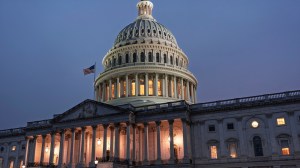Blair in a blur
This is collateral damage the Bush administration could not possibly have reckoned with when its war team leaked the phrase into popular par...

This is collateral damage the Bush administration could not possibly have reckoned with when its war team leaked the phrase into popular parlance in the opening days of their war on terror. Rogue missiles and self-triggered fire on allies may all be part of a day’s work in the battlefield. But certainly regime change in Westminster could not have been part of Washington’s long-drawn plan to rid large chunks of the world of their rulers. As British Prime Minister Tony Blair’s approval ratings keep slipping by the day, it’s time to fix the price he’s had to pay to honour a longstanding transatlantic alliance.
Throughout the build-up to the Second Gulf War and right through it, Blair struck a rather different figure from his senior war ally, US President George W. Bush — never mind the nasty jibes that the two prayed together. He sought to sell the war to his country by appealing to history and the moral position. He appeared decidedly Churchillian as he sought to rally his people and his troops with stirring speeches on Britain’s place in the world, its responsibility to act upon urgent threats to world peace and order. It worked. His former foreign secretary, Robin Cook, remained a lonely figure as he tendered his resignation on the eve of the war, and other tantrum-prone members of government controlled the itch to quit. Only, now it turns out the threat may not have been as urgent as the Blair government led everyone to believe. Leaks are spouting everywhere that an intelligence dossier — the so-called “dodgy dossier” — was “sexed up”. That the quoted threat about Saddam Hussein being able to deploy chemical and biological weapons within 45 minutes was inserted at Downing Street, not MI6 headquarters.
Blair’s pre-eminence in British politics has always been predicated on his devotion to the Project, his distrust of ideological extremes and his allegiance to the longer-term demands of history. This invited trust in ample measure. But now as Saddam’s weapons of mass destruction remain ever more elusive, as charges of fabrication fly thick and fast, it’s not just Blair’s political survival that’s on the line. He probably will stay on as prime minister, there’s still no one else of his stature around. But his reputation as Britain’s moral custodian may be more difficult to rescue.



- 01
- 02
- 03
- 04
- 05




























